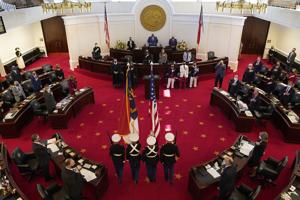School-choice expansion bill advances to North Carolina Senate

(The Center Square) – A bill to expand access to private school scholarships in North Carolina has advanced from the North Carolina House to the Senate.
House Bill 32, dubbed the Equity in Opportunity Act, would increase funding for school-choice vouchers and allow more students to apply for scholarships. It was referred to the Committee On Rules and Operations of the Senate on Thursday after the House approved the measure, 69-49, on Tuesday.
“These [vouchers] are providing educational opportunities to families that otherwise would not have the educational opportunities available to them at a fraction of the cost of what it takes for the state to educate the students,” said Rep. Dean Arp, R-Union, one of the co-sponsors of the bill.
The Equity in Opportunity Act would change the current funding model for North Carolina’s Opportunity Scholarship Program and allow gifted 4-year-olds, military children and foster children to qualify for the program. It also would merge the two current scholarship programs for children with disabilities into the Personal Education Student Accounts for Children with Disabilities and expand funding for the new program.
The measure led to a lengthy debate in the House on Tuesday. House opponents said voucher programs promote school segregation and lack accountability.
Rep. Rachel Hunt, D-Mecklenburg, filed an amendment Tuesday that would have required scholarship recipients to take exams to determine their academic status at the private schools. The amendment failed.
“If we are going to continue to use taxpayer money, we owe it to the students, the taxpayers and the children of our state to make sure they are learning properly,” Hunt said.
North Carolina’s Opportunity Scholarship Program provides state-funded tuition assistance of up to $4,200 a year for private education for low-income students. Under the bill, scholarship awards would be based on up to 70% of the average state per-pupil allocation in the previous fiscal year, starting in the 2022-23 school year. It would increase to up to 80% in the 2023-24 school year.
According to Private School Review, the average private school tuition in North Carolina in 2021 is about $9,867 a year. According to the National Education Association’s (NEA) most-recent data, the average per-pupil spending in North Carolina for the 2019-20 school year was $10,632.
About 11,259 children were awarded Opportunity Scholarship funding at the beginning of the 2020-21 school year, officials said. The General Assembly approved a measure in September that increased the income threshold to qualify for the scholarship, allowing more students to apply during this school year. More than 6,000 new applications have been submitted for opportunity scholarships for the 2021-22 school year, according to Parents for Educational Freedom in North Carolina.
The bill directs the State Education Assistance Authority to use up to $500,000 in remaining funds at the end of the fiscal year to increase public awareness of the program through a partnership with nonprofit organizations.
HB 32 also would allow eligible 4-year-olds to apply for the new Personal Education Student Accounts for Children with Disabilities. Students with certain disabilities would be eligible for scholarship funds of up to $17,000 a year, up to $4,500 of which can be carried forward each year. The carry forward in the account, however, cannot exceed $10,000. Other awards in the program would be based on 85% of the average state per-pupil funding in the previous fiscal year in addition to per-pupil special-needs funding.
The measure also creates a Personal Education Student Account Fund Reserve. About $16 million would be set aside in the reserve in fiscal year 2022. At least $1 million would be allocated annually to the reserve for 10 years, starting in fiscal year 2023. The State Education Assistance Authority would be allowed to retain up to 4% of the funds for administrative costs.
HB 32 authorizes counties to supplement up to $1,000 for students receiving the scholarships. Arp said it ensures counties treat “all students within their county the same.”
A Civitas poll released in January showed a majority of North Carolinians support school choice. According to the results, 72% of North Carolinians surveyed said they favor creating education savings accounts, and 66% favor the Opportunity Scholarship Program.
Senate Republicans also have filed Senate Bill 671 to increase the income eligibility threshold and award amount for the Opportunity Scholarship program and merge the programs for students with disabilities.
Disclaimer: This content is distributed by The Center Square
